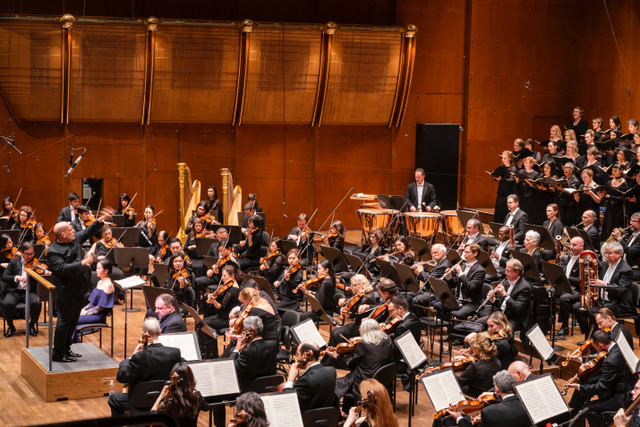 United States Brahms: Ying Fang (soprano), Matthias Goerne (baritone), Concert Chorale of New York (director: James Bagwell), New York Philharmonic / Jaap van Zweden (conductor), David Geffen Hall, Lincoln Center, New York, 7.2.2019. (RP)
United States Brahms: Ying Fang (soprano), Matthias Goerne (baritone), Concert Chorale of New York (director: James Bagwell), New York Philharmonic / Jaap van Zweden (conductor), David Geffen Hall, Lincoln Center, New York, 7.2.2019. (RP)

Brahms – Ein deutsches Requiem
Brahms was an irascible man and a self-proclaimed agnostic. Dvořák, whose talents he recognized and fostered, lamented ‘Such a man, such a fine soul – and he believes in nothing!’ Nonetheless, Brahms’s years on the world stage are bookended by two works with texts taken from the Bible that deal with death. His German Requiem was composed in fits and starts between 1865 and 1868 inspired, perhaps, by the deaths of Robert Schumann in 1856 and his mother almost nine years later. It brought Brahms international fame.
As his own life was drawing to a close, he composed Vier ernste Gesänge in anticipation of the death of his dearest friend and musical soulmate, Clara Schumann, in 1896. The Schumanns had supported him emotionally and professionally early in his career, and although Clara rebuffed his offer of marriage after her husband’s death, they remained devoted friends. His life had come full circle.
It was the first of these, the Requiem, in which Jaap van Zweden conducted the New York Philharmonic. Chorus, soloists and conductor were of the first order, but it was pure luxury to hear the New York Philharmonic perform it. The massive orchestra, complete with two harps and a veritable army of strings, produced a velvety musical carpet of exceptional warmth and richness. Individual sounds, such as those of the two harps, the burnished brass and the relentless beat of the timpani, were part of the subtly interwoven texture. This is why one goes to hear a great orchestra perform such works.
The Concert Chorale of New York was mighty near as impressive. The sopranos were pliant and bloomed beautifully in the long, perilously exposed, sustained phrases. In the climaxes, the tenors were indefatigable, their burnished tone heroic and thrilling. Brahms had a penchant for lower voices, especially altos, and there was no disappointment here with their warm, rich sound. The dramatic announcement of the great fugue in the second movement was a wall of majestic sound from chorus and orchestra, followed by the basses elegantly announcing the theme of the great fugue that follows.
The two soloists, soprano Ying Fang and baritone Matthias Goerne, are polar opposites in most respects, but each was just this side short of perfection. Goerne is a renowned Lieder singer prized for his attention to textural detail, who also brings a distinct physicality to his singing. There are certainly more robust voices to be found, but he plumbed the depths of emotion in the two solos allotted to the baritone. In the sixth movement, his voice blazed impressively as he announced the sounding of the trumpet on the Day of Judgment.
The emotions that Fang summoned were equally profound as those aroused by Goerne, but achieved by totally different means. Her delivery of the text may not be as pointed as his, but her voice was lovely and luminous, floating effortlessly over the hushed orchestral and choral accompaniment. Her poised persona was perfectly aligned with the words of comfort and consolation that she sang.
It is hard to imagine a definitive performance of Brahms’s Requiem. Van Zweden favored brisk but sane tempi and took the same approach to dynamic levels. The individual lines of the colossal fugues were clearly delineated. Brahms’s beautiful melodies soared rapturously, while the great shouts of eternal joy and victory over death were exhilarating. (To me the latter are the apexes of the piece.) Van Zweden also provided the space for textural details to emerge for soloists and chorus alike.
It was a splendid performance. Departing Lincoln Center, I was sorry that I would not be at the two remaining ones.
Rick Perdian
